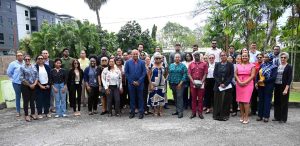‘… the transition to electric vehicles (EVs) presents a promising avenue to combat emissions from the transportation sector’ – Rushton Paray
DEAR Editor,
I am writing to urgently address the critical issue of climate change in Trinidad and Tobago—a matter that demands immediate attention and decisive action.
As a small island developing state heavily dependent on revenue from oil and gas, our nation is facing significant challenges that stem from the effects of global climate change, particularly the alarming increase in flooding, property damage, and threats to agriculture and livestock.
It is disheartening to witness the lack of tangible efforts by the Government of T&T to tackle the imminent climate crisis that looms over our nation. Despite the clear and undeniable risks to our infrastructure and overall well-being, we cannot afford to stand idle any longer. We must develop and implement a comprehensive plan of action that prioritises renewable energy, sustainable practices, and adaptation measures, in order to secure a sustainable future for our beloved country.
At the forefront of this plan is the urgent need to address our vulnerability to flooding. The devastating impact of flooding extends far beyond property damage—it leads to food inflation, destruction of agriculture and livestock, and loss of livelihoods. By implementing an effective flood management strategy, we can minimize these dire consequences. This strategy must include enhancing existing drainage systems, retention and detention ponds, conducting regular maintenance of waterways, and investing in preventive measures to ensure optimal water flow.
Moreover, our agricultural sector, a vital component of our economy and food security, is at great risk due to climate change. To mitigate these risks, we must encourage our farmers to adopt climate-smart agricultural techniques. By promoting practices such as conservation farming and agroforestry, we can build resilience in our agricultural systems, diversify our crops, and safeguard our food production from the impacts of climate change. Providing necessary training programs and financial incentives to farmers will play a crucial role in facilitating this transition.
T&T possesses a remarkable advantage when it comes to renewable energy generation. With abundant solar and wind resources and a large tertiary-educated population, we have the potential to become leaders in the field of renewable energy. It is imperative that we capitalise on these favourable conditions and invest heavily in renewable energy infrastructure. By prioritising the development of solar and wind projects, implementing supportive policies and incentives, and attracting foreign direct investment in the green economy, we can significantly reduce our reliance on fossil fuels and mitigate greenhouse gas emissions.
Furthermore, the transition to electric vehicles (EVs) presents a promising avenue to combat emissions from the transportation sector. It is high time that we embrace this transition by (re)introducing incentives and subsidies for EV purchases, establishing a comprehensive charging infrastructure, and supporting research and development in EV technology. By setting an example and gradually replacing our public transportation fleet with electric or hybrid vehicles, we can make significant strides towards a sustainable transportation system that is less dependent on fossil fuels.
Letters to the Editor can be sent to: letters@azpnews.com or news@azpnews.com
However, our efforts should not be limited to technological advancements alone. Climate change education and awareness must be at the core of our strategy. It is imperative that we integrate climate change education into school curricula, launch widespread public awareness campaigns, and foster partnerships with educational institutions, NGOs, and media outlets. By equipping our citizens with knowledge about the impacts of climate change and the importance of mitigation and adaptation measures, we can mobilise collective action and empower individuals to make sustainable choices in their daily lives.
To finance the implementation of these vital measures, we have at our disposal the Green Fund, with a substantial amount of $9.7 billion. However, it is crucial that we allocate these resources strategically by establishing a National Climate Change Adaptation Fund that prioritises projects aimed at flood reduction, food and water security, and job creation. By utilising the Green Fund and exploring additional funding sources, we can ensure the necessary financial support for climate change adaptation initiatives.
T&T’s commitment to international agreements on climate change should not go unnoticed. As a signatory to various international accords, we have a responsibility to fulfil our commitments and actively participate in global efforts to address climate change. By engaging in international collaborations and partnerships, we can access expertise, funding, and technical assistance for implementing effective climate change mitigation projects. This includes forging alliances with foreign governments, international organizations, and private sector entities to facilitate knowledge sharing, technology transfer, and investments in the green economy.
It is important to emphasise that the timeline for implementing these mitigation measures is within the decade. The urgency of the climate crisis demands immediate action. Delaying or neglecting our responsibilities will only exacerbate the challenges we face and put our nation at even greater risk. The time to act is now, and we must not let this opportunity slip away.
In conclusion, the impact of climate change on Trinidad and Tobago’s infrastructure is a pressing concern that demands immediate attention and decisive action. We cannot afford to ignore the risks posed by flooding, property damage, and threats to our agricultural sector. The comprehensive plan outlined above provides a roadmap for addressing climate change through flood management, sustainable agriculture, renewable energy, electric vehicles, education and awareness, and strategic financing. By implementing this plan, we can secure a sustainable future for Trinidad and Tobago, reduce our vulnerability to climate change, and lead the way towards a greener, more resilient nation.
The time for action is now. We must prioritise the well-being of our citizens, protect our environment, and ensure the prosperity of future generations. Let us unite in this endeavour and work together to create a sustainable and resilient Trinidad and Tobago.
MP Rushton Paray
Mayaro
Opposition Spokesman
Trade & Industry
Letters to the Editor can be sent to: letters@azpnews.com or news@azpnews.com
![]()













